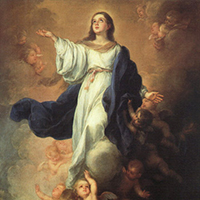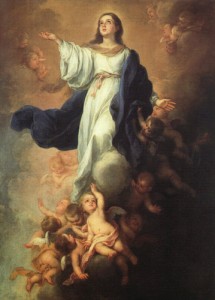The Feast of the Assumption.


Feast of the Assumption: Friday August 15th, 2014
“Holy Day of Obligation”
Anticipated Mass:
Thursday, August 14th 5:30 pm
Masses on August 15th, 2014:
6:30 am
8:20 am (RCE School Mass)
12:05 pm
Please Note:
There is no noon mass on Thursday, August 14th.
—
GLADE PARK, CO (Catholic Online) – On November 1, 1950, Pope Pius XII issued the Apostolic Constitution Munificentissimus Deus, in which he proclaimed the dogma of the Assumption: “Mary, the immaculate perpetually Virgin Mother of God, after the completion of her earthly life, was assumed body and soul into the glory of heaven.”
This was truly a wonderful event, a moment in which the faithful around the world received with certainty a ruling from the Chair of Peter, one which formally proclaimed what was already held and guarded in the deposit of faith the Catholic Church received from Christ through the apostles under the guidance of the Holy Spirit. In reflecting on the sublime wonders of the Assumption and the life of the Mother of God, rays of discerning light flood the intellect, illuminating many aspects of our earthly lives.
We live in an age in which there exists immense forces within our culture which labor to draw us into conformity with what is often described as dark and evil. There can be no doubt that the diabolical nature of these struggles with temptation and bad example are often orchestrated, to some degree, by the Father of Lies: that powerful fallen angel whose pride swelled to perhaps the greatest depths of corruption. While these temptations we face are not entirely new, they are magnified by modern culture in powerfully new ways. One such detrimental, negative element of contemporary culture, heavily engrained in the West, is impurity.
St. Paul reminds us that “All of us once lived . . . in the desires of our flesh, following the wishes of the flesh and the impulses, and we were by nature children of wrath, like the rest” (Eph 2:3). It’s probably safe to say that every adult is, to some degree, wounded by impurity, whether giving in significantly to the many temptations toward impurity, or in being confronted by the various malignant influences impurity promotes in the world.
Those who have, by His Majesty’s wondrous grace, arrived at a point of heartfelt repentance and conversion often anguish over their past life, recounting with misery the many self-inflicted wounds of impurity, bringing to themselves no small suffering. This is so by virtue of a greater closeness to God which always illumines our own sinfulness. As our Father draws us to himself by his loving providence, he nourishes an awareness of our limitations and failures, that we may fly all the more securely into his arms, where we may quietly rest in his protective love.
Some feel they are forever damaged, as if they can no longer be counted as among the pure. This is not so, however, for Christ our Lord holds the crown of purity before us all, desiring to place it on our heads, if only we should trust, if only we should try our best, if only we should love him more than what our eyes might cast themselves upon each day. What has happened in the past is gone, borne away by the healing graces of the sacrament of Reconciliation. Now our Lord’s hands softly reach toward us, the gleam of purity reflected in his eyes, an imperishable crown of immeasurable worth rests in his fingers; a gift he waits to give; a gift of which only our Lord himself can make us worthy to receive.
St. Paul reminds us of the new life we are given, a free and merciful gift from God: “But God, who is rich in mercy, because of the great love he had for us, even when we were dead in our transgressions, brought us to life with Christ (by grace you have been saved), raised us up with him, and seated us with him in the heavens in Christ Jesus, that in the ages to come he might show the immeasurable riches of his grace in his kindness to us in Christ Jesus” (Eph 2:3-7).
The Virgin Mother: Model Of Purity Supreme
Those who desire to receive the crown of purity from our Lord should not hesitate to fly to the Virgin Mary, Mother of God, whose tender love and concerned intercessory help is never withheld from her children. It is our Virgin Mother who will take us into her worthy hands, guide us toward her Son, and lower the glorious crown upon our heads.
If we should state that the Virgin Mary is the greatest Christian who ever lived, we would be correct; yet such a statement does little to relate the indescribable beauty of her dedication to her Son, her eagerness to suffer for the will of God, her complete trust, and her total purity of heart which far surpasses our present understanding. There is simply no better model of human purity than our sweet Virgin Mother, who exists as Queen of Heaven, raised in heavenly glory above all the angels and saints.
St. Bernard of Clairvaux writes of the Virgin Mother, “Let us honor [Mary] for the purity of her body, the holiness of her life. Let us marvel at her fruitful virginity, and venerate her divine Son. Let us extol her freedom from concupiscence in conceiving and from all pain in bearing. Let us proclaim her to be reverenced by the Angels, desired by the nations, foretold by the patriarchs and prophets, chosen out of all and preferred before all. Let us magnify her as a channel of grace, the mediatrix of salvation, the restorer of ages, and as exalted above the choirs of angels to the very heights of Heaven.”
In Munificentissimus Deus Pope Pius XII taught that from all eternity God “regards Mary with a most favorable and unique affection.” We should understand that as God regards Mary in such a way, he especially desires to grant her every prayer. If we seek purity, it is the Virgin Mary whose intercession will, through the love of her Son, win for us the graces of which we are in such urgent need. She is indeed a “channel of grace” as St. Bernard wrote.
Pius XII tells us that when the fullness of time came, God put the wondrous plan of his “providence into effect in such a way that all the privileges and prerogatives he had granted to her in his sovereign generosity were to shine forth in her in a kind of perfect harmony” (MD, 3).
The Virgin Mother’s privileges are truly sublime wonders. As St. Luke records in his gospel, the angel Gabriel first addressed Mary with these words: “Hail, favored one! The Lord is with you.” Though Mary “was greatly troubled at what was said and pondered what sort of greeting this might be,” Gabriel said to her, “Do not be afraid, Mary, for you have found favor with God” (see Lk 1:26-30).
The Council of Trent declared that a “special privilege from God” was “given to the Blessed Virgin.” In 1854 Pope Pius IX decreed in Ineffabilis Deus the dogma of the Immaculate Conception: “The most Blessed Virgin Mary was, from the first moment of her conception, by a singular grace and privilege of almighty God and by virtue of the merits of Jesus Christ, Savior of the human race, preserved immune from all stain of original sin.”
St. Thomas Aquinas taught that the fullness of grace which Mary received implied confirmation in grace and therefore sinlessness (S. th. III 27, 5 ad 2). Pius XII decreed in Mystici Corporis that Mary “was immune from all sin, personal or inherited.” The Virgin Mary remained free from every personal sin her whole life, and is a model of supreme purity. Through her unique relationship of union and love with her Son as his Mother, the Virgin Mary shines with a light of purity of far greater brilliance than the stars in the heavens. We truly have a Mother whose love is unwaveringly pure, and who unceasingly cares for her children in their every time of need.
“Jesus is Mary’s only son, but her spiritual motherhood extends to all men whom indeed he came to save: The Son whom she brought forth is he whom God placed as the first-born among many brethren, that is, the faithful in whose generation and formation she co-operates with a mother’s love” (CCC No. 501).
The Pure In Heart
The sixth beatitude proclaims, “Blessed are the pure in heart, for they shall see God” (see Mt 5:8). The Catechism of the Catholic Church teaches us that “‘Pure in heart’ refers to those who have attuned their intellects and wills to the demands of God’s holiness, chiefly in three areas: charity; chastity or sexual rectitude; love of truth and orthodoxy of faith” (No. 2518).
The baptized must “struggle against concupiscence of the flesh and disordered desires” (CCC No. 2520), yet with God’s grace we will prevail. When we meditate upon the meaning of “pure in heart,” we can find no better example of these Christian virtues than our Virgin Mother who was assumed body and soul into heaven.
The Mother of God lived charity in its fullness, from her nourishing care of the Christ child in Bethlehem, to the wound of love she experienced deep within her heart which, pierced by that terrible sword of sorrow as she stood at the base of the cross, held firm in trust. As for love of truth and orthodoxy of faith, the Virgin Mary, as the Mother of God, is a most perfect example of these virtues, for her Son is Truth, and she loves him and all that he is with maternal devotion.
During St. Bonaventure’s Fourth sermon on Annunciation, he described Mary as a “tabernacle” in which the Lord rested. He encourages the faithful to turn toward the Blessed Mother for help: “Let us go to the Virgin with great confidence, and we will tranquilly find her in our necessities. Therefore this tabernacle is rightly to be honored, and to this tabernacle flight should be made, in which the Lord rested so familiarly, so that the Blessed Virgin herself could say truly and literally, “Who made me rested in my tabernacle” (IX, 673).